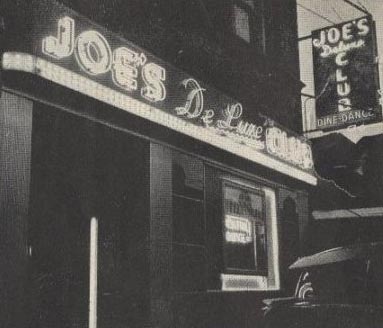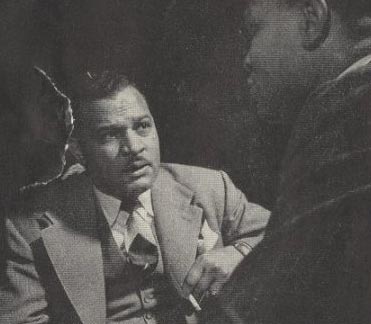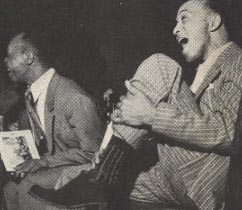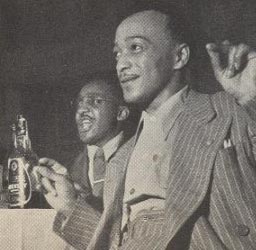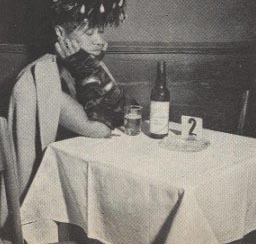Difference between revisions of "Queer Business: The Case of Joe Hughes"
m |
|||
| (5 intermediate revisions by 2 users not shown) | |||
| Line 1: | Line 1: | ||
| + | Text by Tristan Cabello. Copyright (©) by Tristan Cabello, 2008. All rights reserved. | ||
| + | |||
| + | |||
== Queer Entrepreneurship in Bronzeville == | == Queer Entrepreneurship in Bronzeville == | ||
| − | [[Image:hughes9.jpg|frame|none| | + | [[Image:hughes9.jpg|frame|none|Joe's Deluxe, Photo by Wayne F. MIller, 1948]] |
| − | As soon as the early forties, several Bronzeville Black entrepreneurs realized the revenue-generating potential of queer entertainment and many middle-class African-American heterosexuals saw the potential for financial reward in the presentation of | + | As soon as the early forties, several Bronzeville Black entrepreneurs realized the revenue-generating potential of queer entertainment and many middle-class African-American heterosexuals saw the potential for financial reward in the presentation of Black Homosexuality.<ref>“Show At Joe Hughes’ is Hot, Tuneful and Pretty,” The Chicago Defender, March 6, 1943, 19; “Ziggy Johnson Back As Deluxe Producer,” The Chicago Defender (National Edition), December 2, 1949, 26; “Female Impersonators,” Ebony, March 1953, 5 </ref> |
| Line 10: | Line 13: | ||
| − | [[Image:hughes11.jpg|frame|none| | + | [[Image:hughes11.jpg|frame|none|Joe Hughes, Photo by Wayne F. MIller, 1948]] |
| Line 19: | Line 22: | ||
| − | [[Image:hughes.jpg|frame|none| | + | [[Image:hughes.jpg|frame|none|Inside Joe's Deluxe, Photo by Wayne F. MIller, 1948]] |
| + | |||
| + | |||
| + | “Joe’s Deluxe” opened its doors in 1938 and enabled Hughes to preside over forty employees and soon to own the entire building in which the club operated. | ||
| + | |||
| + | |||
| + | As a proof of Hughes’ respectability, [http://en.wikipedia.org/wiki/Ebony_magazine Ebony Magazine] stated that they were friends with the [http://en.wikipedia.org/wiki/Eddie_%27Rochester%27_Anderson Eddie ‘Rochester’ Andersons] and [http://en.wikipedia.org/wiki/Joe_Louis Joe Louis], along with other celebrities, proving that Black Queer entertainment was recognized as financially rewarding but also a way to access the upper class. | ||
| − | + | Several prominent upper-class African-Americans decided it was not disgraceful to sponsor homo-friendly events and make money from them, and Hughes, taking advantage of the powerful status that cabaret-owning had conferred him, had no problem advertising in the Chicago Defender and Ebony Magazine. <ref>“Mayor of Bronzeville To Be Inaugurated Soon” The Chicago Defender, January 25, 1941, 18; “Royal Twenty Party Voted Big Success, Joe’s Deluxe Club is Scene of Jamboree,” The Chicago Defender (National Edition), June 8, 1940, 15; “Fred Carter Host at Gay Swing Party,” The Chicago Defender (National Edition), July 6, 1940, 20.</ref> | |
| Line 28: | Line 37: | ||
| − | [[Image:hughes2.jpg|frame|none| | + | [[Image:hughes2.jpg|frame|none|Inside Joe's Deluxe, Photo by Wayne F. MIller, 1948]] |
| Line 34: | Line 43: | ||
| − | Valda Gray, the 1930s pioneer of drag shows on the South Side, served as producer of the popular review of four impersonation shows—all introduced by gay comedian Calla Donia—that were presented per night. As White northsiders visited the club less and less frequently, the crowd consisted mainly of Black working-class and middle-class women and men. Heterosexuals attended the female impersonators’ performances en masse but still outnumbered | + | Valda Gray, the 1930s pioneer of drag shows on the South Side, served as producer of the popular review of four impersonation shows—all introduced by gay comedian Calla Donia—that were presented per night. As White northsiders visited the club less and less frequently, the crowd consisted mainly of Black working-class and middle-class women and men. Heterosexuals attended the female impersonators’ performances en masse but still outnumbered Black Queers in the audience. <ref>“Swinging the News” The Chicago Defender (National Edition), December 20, 1947, 9; Banyard, Lorenzo, interviewed by Allen Drexel; “Female Impersonators: Unique Chicago Night Club Features make-believe Ladies as Entertainers,” Ebony, March 1948, 59-63.</ref> |
| − | [[Image:hughes5.jpg|frame|none| | + | [[Image:hughes5.jpg|frame|none|Inside Joe's Deluxe, Photo by Wayne F. MIller, 1948]] |
| Line 43: | Line 52: | ||
| − | [[Image:hughes3.jpg|frame|none| | + | [[Image:hughes3.jpg|frame|none|Inside Joe's Deluxe, Photo by Wayne F. MIller, 1948]] |
| + | |||
| + | Joe's success in the homo-friendly circuit allowed him to rise to the top of Bronzeville’s hierarchy by being elected “Mayor of Bronzeville” in 1941, easily winning the election with 231,000 votes to 166,800 votes for his opponent, Mr. Roosevelt Phillips. | ||
| − | |||
| + | By holding his “coming inaugural” at Joe’s Deluxe, and presenting a female impersonator review that night, several members of the upper class enjoyed a homo-friendly event, drawing a new crowd to the club.<ref>Female Impersonators,” Ebony; Cristion, Jacques, interviewed by Allen Drexel; Banyard, Lorenzo, interviewed by Allen Drexel; Myles Vollmer, “The New Year’s Eve Drag,” Box 139, Folder 2, </ref> | ||
| + | |||
| + | [http://www.queermusicheritage.us/drag-swanson.html See Full Article on Joe Hughes in Ebony Magazine here] | ||
| + | |||
| + | [http://outhistory.org/wiki/The_Johnson_Publishing_Company NEXT: The Johnson Publishing Company] | ||
| + | |||
| + | |||
| + | ==References== | ||
<references/> | <references/> | ||
| + | |||
| + | |||
| + | {{Protected}} | ||
| + | |||
| + | |||
| + | ==Categories== | ||
| + | [[Category:AFRICAN AMERICANS]] | ||
| + | [[Category:CHICAGO]] | ||
| + | [[Category:BUSINESS]] | ||
Latest revision as of 14:05, 8 May 2009
Text by Tristan Cabello. Copyright (©) by Tristan Cabello, 2008. All rights reserved.
Queer Entrepreneurship in Bronzeville
As soon as the early forties, several Bronzeville Black entrepreneurs realized the revenue-generating potential of queer entertainment and many middle-class African-American heterosexuals saw the potential for financial reward in the presentation of Black Homosexuality.[1]
Joe Hughes
The case of Joe Hughes, founder and director of Joe’s Deluxe, illustrates this trend. In the late twenties, Hughes quit his job as a fur salesman and opened a tavern on Chicago’s West Side with his cousin. A decade later, after witnessing the popularity of Chicago’s Drag Balls, Hughes invested in a new venue at 5524 South State Street with the idea of staging a review of female impersonators. [2]
Joe's Deluxe Club
“Joe’s Deluxe” opened its doors in 1938 and enabled Hughes to preside over forty employees and soon to own the entire building in which the club operated.
As a proof of Hughes’ respectability, Ebony Magazine stated that they were friends with the Eddie ‘Rochester’ Andersons and Joe Louis, along with other celebrities, proving that Black Queer entertainment was recognized as financially rewarding but also a way to access the upper class.
Several prominent upper-class African-Americans decided it was not disgraceful to sponsor homo-friendly events and make money from them, and Hughes, taking advantage of the powerful status that cabaret-owning had conferred him, had no problem advertising in the Chicago Defender and Ebony Magazine. [3]
The Female Impersonators' Mecca
Joe’s Deluxe therefore quickly became Bronzeville’s most popular homo-friendly nightclub in the late forties, as DeLisa and the Cabin Inn declined in popularity and eventually closed. Famous female impersonators in the circuit, including “Petite Swanson” (Alphonso Hersley), “Dixie Lee” (Robert Beck), “Sandra” (Chester P. Frederick) and “Nancy Kelly” (Lorenzo Banyard) performed in this “impersonator’s mecca,” as a Chicago Defender journalist claimed. [4]
Valda Gray, the 1930s pioneer of drag shows on the South Side, served as producer of the popular review of four impersonation shows—all introduced by gay comedian Calla Donia—that were presented per night. As White northsiders visited the club less and less frequently, the crowd consisted mainly of Black working-class and middle-class women and men. Heterosexuals attended the female impersonators’ performances en masse but still outnumbered Black Queers in the audience. [5]
Joe Hughes' Consecration
Joe's success in the homo-friendly circuit allowed him to rise to the top of Bronzeville’s hierarchy by being elected “Mayor of Bronzeville” in 1941, easily winning the election with 231,000 votes to 166,800 votes for his opponent, Mr. Roosevelt Phillips.
By holding his “coming inaugural” at Joe’s Deluxe, and presenting a female impersonator review that night, several members of the upper class enjoyed a homo-friendly event, drawing a new crowd to the club.[6]
See Full Article on Joe Hughes in Ebony Magazine here
NEXT: The Johnson Publishing Company
References
- ↑ “Show At Joe Hughes’ is Hot, Tuneful and Pretty,” The Chicago Defender, March 6, 1943, 19; “Ziggy Johnson Back As Deluxe Producer,” The Chicago Defender (National Edition), December 2, 1949, 26; “Female Impersonators,” Ebony, March 1953, 5
- ↑ “Bronzeville’s First Lady Set For Inauguration,” The Chicago Defender (National Edition), February 1, 1941, 17; “Bronzeville Mayor Still Joe Hughes,” The Chicago Defender, November 2, 1940, 1
- ↑ “Mayor of Bronzeville To Be Inaugurated Soon” The Chicago Defender, January 25, 1941, 18; “Royal Twenty Party Voted Big Success, Joe’s Deluxe Club is Scene of Jamboree,” The Chicago Defender (National Edition), June 8, 1940, 15; “Fred Carter Host at Gay Swing Party,” The Chicago Defender (National Edition), July 6, 1940, 20.
- ↑ At Joe’s,” The Chicago Defender (National Edition), December 9, 1939, 20; “Here and There by Bob Hayes,” The Chicago Defender (National Edition), July 27, 1940, 20
- ↑ “Swinging the News” The Chicago Defender (National Edition), December 20, 1947, 9; Banyard, Lorenzo, interviewed by Allen Drexel; “Female Impersonators: Unique Chicago Night Club Features make-believe Ladies as Entertainers,” Ebony, March 1948, 59-63.
- ↑ Female Impersonators,” Ebony; Cristion, Jacques, interviewed by Allen Drexel; Banyard, Lorenzo, interviewed by Allen Drexel; Myles Vollmer, “The New Year’s Eve Drag,” Box 139, Folder 2,
